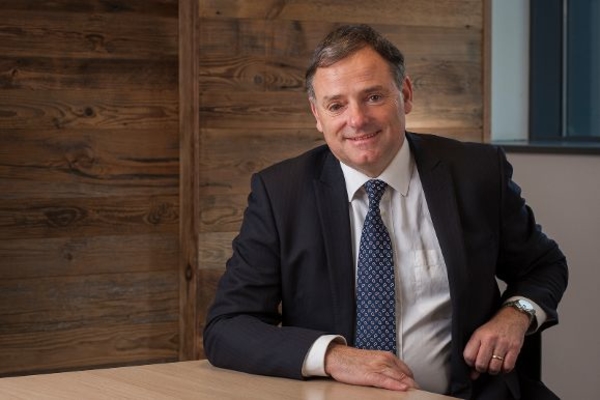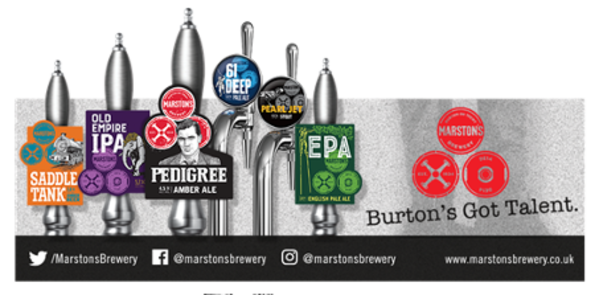Marston's chief on the future for pubs
Added: Tuesday, June 27th 2017

What is the future for the British pub now beer for home consumption outsells draught beer? Ralph Findlay is chief executive of the Marston’s group that owns 1,565 pubs and they create 90 per cent of the group’s profits.
And as Marston’s is the biggest producer of cask ale in the UK, the group’s top man should have valuable thoughts on the future of beer and where and how we drink it.
The name Marston’s is inextricably linked to Burton-on-Trent but I met Ralph Findlay in the spacious new group head offices in Wolverhampton. The complex is alongside Banks’s brewery, which retains the name, but the offices are clearly labelled Marston’s.
The atmosphere is laid back and there’s no sense of hierarchy. Ralph makes two cups of tea in a communal kitchen and we head for his office that’s in sight of Wolverhampton Wanderers’ ground. It’s a football club that, like the battered British pub, has seen better days.
“Back in 2007 and 2008 it became clear that the way beer was being drunk in pubs was changing fundamentally,” Ralph says. “Food was increasing and the smoking ban had had a big impact on people using pubs.
“Our research showed that people were drinking less but they were drinking better quality. Earlier, in 2005, we saw that beer volumes were declining, even for Pedigree and Banks’s. Unless there was change then breweries would inevitably close.”
Ralph and his team looked at the United States for inspiration at a time when the craft beer revolution was gathering steam.
“The emphasis there was on smaller and local brands with style and taste. The craft breweries were taking share from the multi-nationals. We drew the conclusion that we needed to change our portfolio and offer a wider range and coverage.”
He says Marston’s resisted pressure from the City of London to separate pubs and brewing. “We used to control carefully what brands could be sold from our portfolio but from 2008 we changed the rules and licensees now have choice.”
Ralph says the pub market has witnessed big changes – and the biggest change has been the move to pub-restaurants where there’s “immense competition”.
“But,” he stresses, “we don’t forget the pub. The pub has sustainability and the pub is our brand. Our new pub-restaurants must have handpumps, a fire in winter and an informal atmosphere. They must be pubs.”
If the pub is so important to Marston’s, why have so many been sold? Ralph Findlay admits that some 800 pubs have been jettisoned over the past six to seven years.
“It’s not because they were wet-led pubs,” he says adamantly, “but because they happened to be in the wrong places where nobody went anymore.” Wet-led is an industry term for pubs where beer rather than food is the driving force.
“We still like community and wet-led pubs – we’ve bought some from Ei [the new name for Enterprise Inns]. We’re looking at wet-led pubs again as they’re out-performing pub-restaurants. There’s a huge amount of closures and operators have to make pubs more attractive: quality has improved as a result.”

Ralph says the momentum is strong in community pubs thanks to the continued increase in craft beers. It’s important, he says, to offer a good range of beers and beer styles.
“Big brands are being squeezed. Marston’s has had to change – we are no longer just an ale brewer. We sell Warsteiner, Erdinger, Krusovice, Estrella Damm and Kaltenberg. We celebrate all beer.”
And Marston’s is also a major player in the bottled beer sector. A new bottling line in Burton has enabled the group to control 25 per cent of the bottled sector and to offer bottling facilities for other brewers, including Adnams.
But the take-home market is tough, Ralph admits, with global brewers such as AB InBev and Heineken offering beers at low prices that other brewers can’t match if they’re to make a profit.
“We told George Osborne [Darling’s successor as chancellor] that if he didn’t scrap the escalator then pubs would close,” Ralph says. There was widespread delight when Osborne did axe the escalator but Ralph was deeply disappointed that the new chancellor, Philip Hammond, had brought in a “back door” duty increase in this year’s budget that will put around 10 pence on the price of a pint.
With the ink scarcely dry on the £55 million deal to buy Charles Wells’s Bedford brewery and key brands, Marston’s owns Banks’s, Brakspear, Jennings, Ringwood, Thwaites, Wells and Wychwood. Three companies – Greene King, Marston’s and Molson Coors – now account for 37 per cent of the cask ale sector. Is such dominance healthy for brewing and consumer choice?
Ralph said Marston’s had a different strategy to the other two companies and kept open breweries it had bought.
“The place of production is important. By and large, all the beers we have acquired are brewed on their original sites. Marston’s has a strong competitive advantage – we sell to more than 9,000 pubs and that’s good for those brands. The distribution potential will increase following the acquisition of the Charles Wells’s brands and a new Punch distribution contract.”
He said Marston’s would give greater presence in London to the Courage and Young’s beers brought from Wells and he hoped he could do the same for McEwans in Scotland.
He denied emphatically that Wells’s recipes would change. “We never do it. We fiddle with ABVs occasionally but the Wells’s beers will stay the same – including Young’s Bitter.”
Earlier this year Marston’s rebranded several of its key ales, including Pedigree, with new pumpclips and labels (see above). Had the exercise been worthwhile? While I welcomed Pedigree in bottle-conditioned form, I felt the image of the man on the label, with short-back-and-sides, Brylcreemed hair, looked like the 1960s cricketer Fred Trueman (it was actually George Peard a former Burton brewer in the 1950s).
“It was a risk,” Ralph agrees, “but we have to help brands in decline. It’s a made a difference. Younger drinkers say they will try the beers and it’s made those beers more relevant.”
Relevance is the name of the game. Ralph Findlay’s mission is to make both pubs and beer relevant to a demanding modern market and audience.
And where does he stand on the “craft versus cask” debate?
“As a consumer, I like beer and a spectrum of tastes and flavours. Both cask and craft have their merits.”




